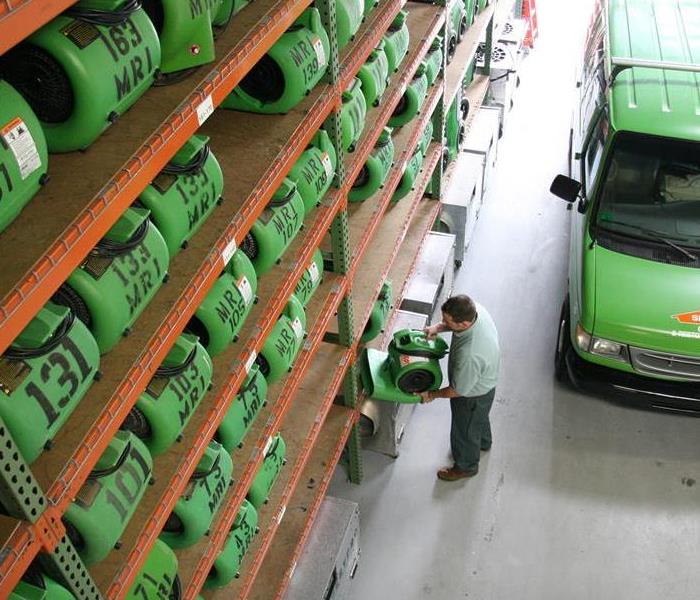How to Safely Deal With a Water Damage Emergency
4/13/2020 (Permalink)
Summary: SERVPRO of Hurst-Euless-Bedford stresses the importance of prioritizing safety when dealing with a water damage emergency.
When a home or business owner is confronted with a large-scale water damage incident, it is vital to prioritize the safety of families, employees, customers, and other individuals. SERVPRO of Hurst-Euless-Bedford is sharing 7 safety tips to help people navigate the aftermath of a water damage emergency. These safety tips are applicable for residential or commercial water damage that is internally sourced from a leaky faucet, a cracked water pipe, or a broken water heater. Water damage resulting from a natural disaster such as a flood, tornado, or hurricane has a set of issues that go beyond the extent of an internally sourced water damage situation.
Tip #1: Stay calm. Do not panic.
Water damage to a home or business is stressful, especially if the water damages expensive furniture, ruins family heirlooms, destroys valuable inventory, or requires the property to be evacuated for a period of days or even weeks. Trained, experienced professionals take care of water damage emergencies every day, and they eliminate a large portion of the stress and anxiety. Skilled restoration experts do a thorough job in a timely fashion, so people do not have to worry.
Tip #2: Identify and eliminate electrical hazards.
A flooded house presents a challenge to the homeowner. Floor covering can be replaced, upholstery can be cleaned, and baseboards can be repainted. Electrocution, however, can be fatal.
The first concern is always personal safety, even before identifying the source of the flooding and shutting off the water. If the flooding is extensive, electrical shock is always a concern. Avoid stepping in the water until sources of potential electrical shock have been identified and resolved. Appliances and extension cords in the water are particularly dangerous. Be safe. Shut off the power from outside the home or commercial building. A water damage issue could turn into a fire hazard if electrical appliances are exposed to water.
Tip #3: Identify any chemical or sanitation hazards before entering the residence or building.
Strong smells, burning and itching eyes, or skin irritation may be indicators that the water may have come into contact with activated chemicals. Carefully do a smell test. Is the liquid on the floor more than water? Is it contaminated with raw sewage? It is unsanitary to track raw sewage throughout the entire house in the search for the water leak. What may have been a relatively simple clean up could be expanded to include the whole house.
Tip #4: Avoid slipping and falling.
Watch out for slippery surfaces. Wet floors can be exceedingly slippery, so hold on to cabinets or furniture when walking on slick kitchen or bathroom floors. Wear shoes or boots that provide stability and reduce the possibility of slipping and falling. It is better to keep shoes on while walking through the flooded areas to prevent slipping and to protect the feet from injury.
Tip #5: Use a flashlight when walking through areas that are dark or dimly lit.
If the flooding was so extensive that the electricity needed to be turned off, use a flashlight to illuminate the home. Proper lighting improves balance and stability. Groping around in the dark can lead to head and hand injuries. Further safety hazards can be created if furniture is turned over or glass is broken.
Tip #6: Wear rubber gloves and other protective clothing, if possible.
Wearing rubber gloves, protective eyewear, sturdy shoes or boots, and a mask or respirator are advisable if at all possible. If the leak has persisted over an extended period of time, mold, mildew, and bacteria may have had time to grow. Mold exposure can cause health effects. Also, the liquid on the floor and carpet may be contaminated with raw sewage. Chemicals may have mixed with the water and may have become activated, toxifying the air and the water. Any exposure to these contaminants could be hazardous or even deadly.
Tip #7: Avoid lifting heavy items.
Water-logged pillows, cushions, clothing, carpet, and padding are very heavy. Be careful walking across slippery surfaces. Carrying a heavy load or slipping unexpectedly can wrench the back or cause other injuries.
If the situation is severe and the environment is hazardous, the safest course of action may be to shut off the electricity and water, call the water damage specialists, and wait. Each crisis is unique and carries its own set of safety hazards. Immediate response from a water damage specialist is essential because much of the damage is done in the first few hours of the incident. Getting a trained technician with the best equipment on the scene as soon as possible is always a best-case scenario in a worst-case situation. For water damage restoration in Hurst-Euless-Bedford, TX, contact SERVPRO by phone at (817) 595-0004 or visit the website at https://www.SERVPROhurst-euless-bedford.com.






 24/7 Emergency Service
24/7 Emergency Service
